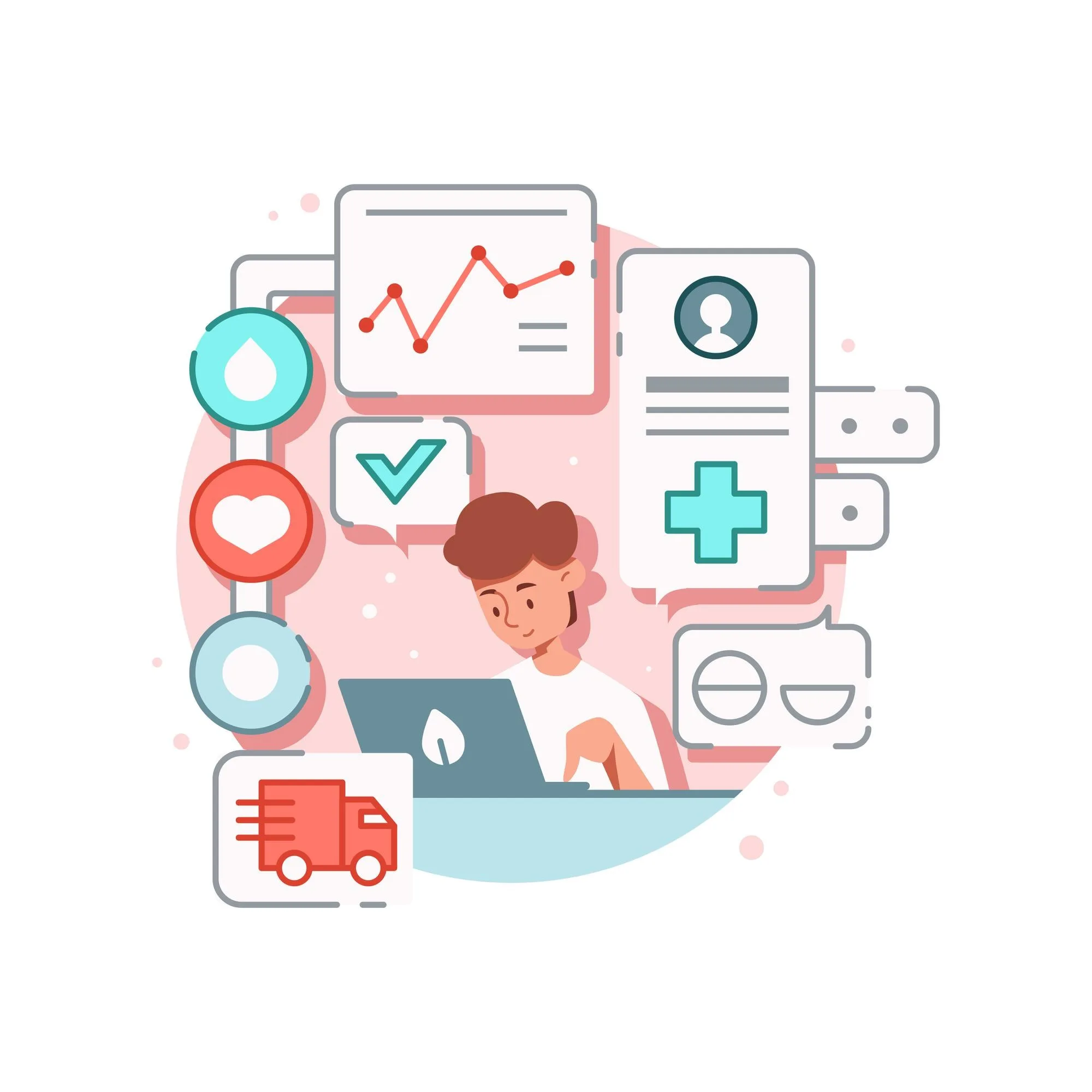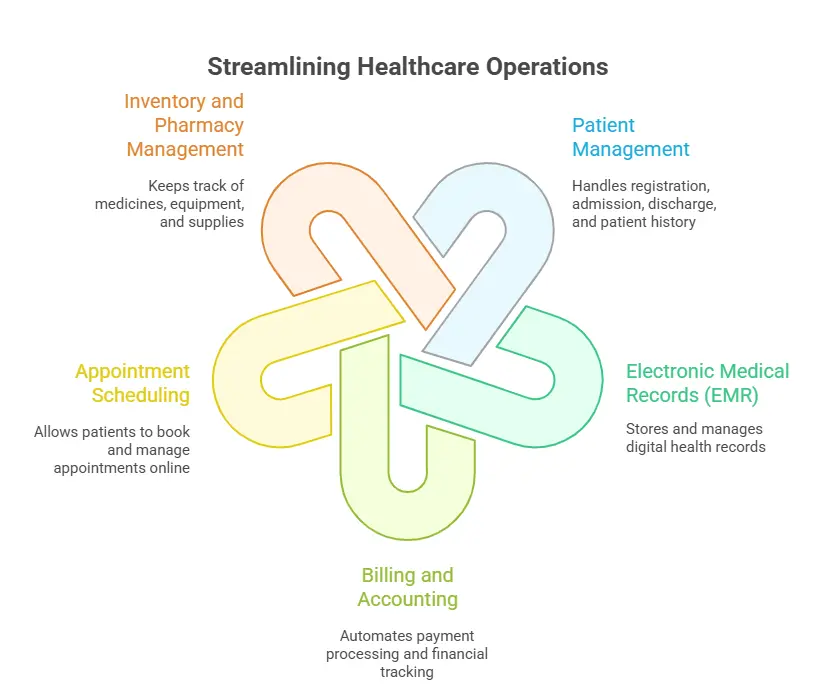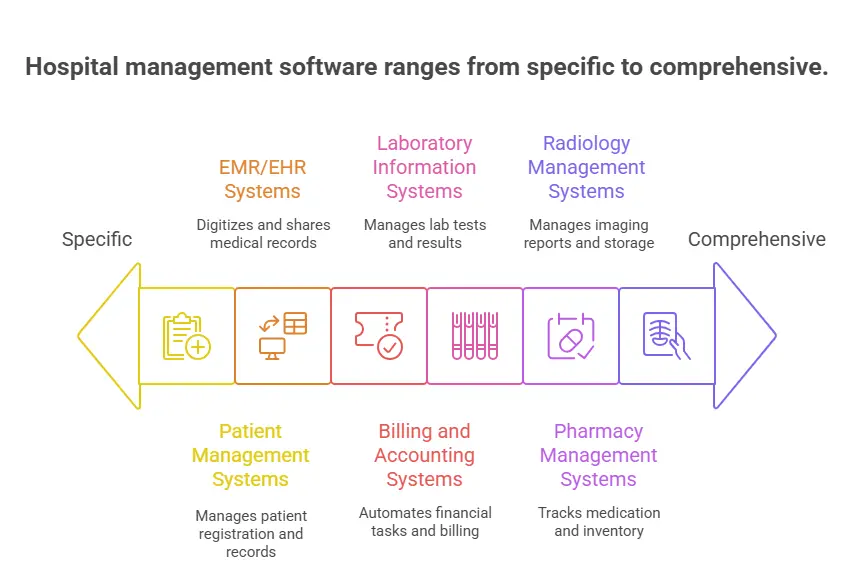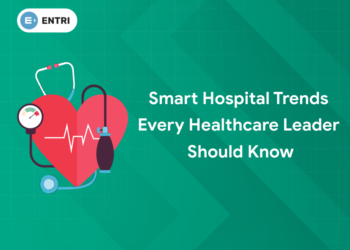Table of Contents
Hospital management involves many daily tasks such as patient registration, invoicing, appointments and record keeping. Doing all this manually can be very time- consuming and leads to error. Hospital Management Software (HMS) helps simplify this by bringing together all hospital activities on one digital platform. This means that doctors, nurses and staff can manage their work more efficiently and focus more on patient care. From scheduling appointments to handling payments and reports, everything can be done quickly and accurately. In this blog, we will learn what hospital management software is, how it works, and why it is becoming so important in today’s healthcare.
Explore Your Future in Hospital Administration! Enroll now!
Introduction
Hospital Management Software (HMS) is converting the way healthcare institutions function by bringing all hospital functions under one digital system. From handling patient records and doctor schedules to billing, pharmacy, and inventory — everything can be handled smoothly at the same time. In today’s digital healthcare environment, performance and accuracy are important, and the HMS software helps to achieve both.
By automating regular tasks and reducing manual work, it allows medical staff to focus more on patient care instead of administrative duties. Hospitals, clinics, and healthcare centers use this software to improve communication, minimizing simple mistakes, and make specific coordination throughout the departments. Whether it’s a small clinic or large hospital network, HMS ensures better organization, honesty, and patient satisfaction. In this blog, we’ll discover what hospital management software program is, its key functions, features, and how it is transfered to modern healthcare.
What is Hospital Management Software?
1: What is the primary role of a hospital administrator?
Hospital Management Software is a digital system designed to control and simplify all the operations and activities of a hospital or healthcare organization. It integrates different departments—including administration management, finance, pharmacy, laboratory, and patient care—into a single platform, assisting healthcare providers deliver efficient and systematic services.
The major purpose of HMS is to automate every day duties like patient registration, appointment scheduling, billing, medical record keeping, and report generating technology. By doing this, it reduces manual paperwork, saves time, and minimizes human errors. It also improves coordination between the medical staff, ensures better communication and quick decision-making. The HMS generally includes several key modules, including:
Patient Management: It handles registration, admission, discharge, and patient history.
Electronic Medical Records (EMR): They stores and manages digital health records as easily accessible.
Billing and Accounting: Automates payment processing, insurance coverage claims, and financial tracking.
Appointment Scheduling: It allows patients to book and reshedule appointments online easily.
Inventory and Pharmacy Management: Keep monitoring medication, other equipments, and supplies.
By the usage of Hospital Management Software, healthcare agencies can improve their efficiency, accuracy, and the patient experience. It guarantees that hospitals run easily, secure data, and patient care becomes more personalized and well maintained.
Hospital Administration Course with Assured Career Growth
Hospital Administration Course by Entri App: Master essential healthcare management skills, gain certification, and secure top roles in leading hospitals
Join Now!Importance of Hospital Management Software in Healthcare
The healthcare industry is developing rapidly, and managing hospitals rules and regulations effectively has become more complicated. Hospital Management Software (HMS) plays a key role in improving how healthcare industries feature by combining data, technology and automation. It allows hospitals deliver quality care treatments at the same time as maintaining proper organization, manage over all operations and administration duties.
1. Centralized Control and Integration
Hospitals handle few tasks across departments like administration, pharmacy, finance, and patient offerings. The HMS brings a majority of these areas collectively under a single digital platform. This centralization removes confusion, improves coordination between staff, and allows every department to work smoothly with one another.
2. Faster Decision-Making
In healthcare, quick and correct decisions can save lives. HMS presents real-time get access to patient personal information, test results, and hospital analytics, allowing each doctors and management to respond quicker. Instant access to records guarantees that essential movements—like emergency admissions or emergancy treatment changes—may be taken without any delay.
3. Transparency in Hospital Processes
Maintaining transparency in hospital activities builds trust among patients and staff. HMS maintains all transactions—including billing, prescriptions, and reports—digitally recorded. This honesty helps prevent discrepancies, helps compliance with healthcare standards, and ensures responsibility at every stage.
4. Supports Regulatory Compliance
Hospitals should observe strict healthcare rules and data safety laws. The HMS facilitates keep compliance through recording all activities, keeping accurate data logs, and protective patient records. This reduces the risk of penalties and guarantees hospitals operate according with legal and ethical standards.
5. Enhances Patient Engagement
HMS systems regularly include patient portals that allow individuals to access reports easily, book appointments, and communicate with healthcare providers easily. This direct involvement improves patient satisfaction and keeps them informed about their treatment journey.
6. Promotes Data-Driven Management
Modern hospitals depend on insights to enhance performance. HMS affords particular analytics on hospital operations, team of staff efficiency, patient inflow, and financial health. With this data, administrators can plan better, allocate resources successfully, and constantly enhance healthcare facility performance.
7. Builds a Foundation for Digital Healthcare
As the world moves toward digital healthcare and telemedicine, HMS make the backbone of digital transformation. It enables integration with online consultation systems, electronic health records, and mobile applications—making hospitals future-equipped and extra connected than ever.
Key Features of Hospital Management Software
Hospital Management Software (HMS) is designed to make hospital operations smoother, quicker, and well-prepared. It connects all key areas of a hospital facility — from patient registration and billing to pharmacy and reporting — all-in-one platform. Below are some of the most important features that make HMS a valuable tool for hospitals and clinics of all sizes.
1. Centralized Patient Information
One of the most important strengths of HMS is its capability to maintain a organized patient database. It stores every patient’s details, consisting of personal information, previous medical history, lab test results, and treatment records. This ensures that doctors and nurses have quick access to accurate data at any time, minimizing delays and enhancing the excellent quality care. Having all patient details at one place also prevent duplication of data’s and manages manual work.
Key highlights:
- Digital storage of complete patient records
- Quick access for authorized staff
- Improved data accuracy and transparency
2. Streamlined Appointment Scheduling
Managing appointments manually time-consuming and lead to mistakes. The HMS simplifies this process with an automatic scheduling system that allows patients to book, reschedule, or cancel appointments online. Doctors can easily view their daily schedules, while patient acquire reminders via SMS or email. This characteristic helps minimize waiting time and ensures smooth coordination among patients and healthcare experts.
Key highlights:
- Online appointment booking and rescheduling
- Automated reminders for upcoming visits
- Reduced waiting times and better patient flow
3. Efficient Billing and Financial Management
Billing in hospitals may be complicated, related to different departments and services. HMS automates this process by using accurate invoices based on the treatment, assessments, and medications provided. It helps more than one payment modes and integrates with insurance coverage systems for smooth claim processing. This not only improves accuracy however additionally complements patient satisfaction with transparent billing.
Key highlights:
- Automated billing and receipt generation
- Integration with insurance and payment gateways
- Financial reports and expense tracking
4. Laboratory and Test Management
HMS helps streamline diagnostic operations through handling lab requests, test results, and pattern tracking digitally. Doctors can directly access test results immediately within the system, boosting diagnosis and treatment decisions. Automation also helps to eliminate mistakes that frequently occur in manual report managing.
Key highlights:
- Digital test requests and result sharing
- Faster diagnosis with integrated access
- Reduced manual errors in reporting
5. Pharmacy and Inventory Control
Managing medicines and clinical materials is important for any hospital. HMS includes an inventory management module that maintains stocks level, expiry dates, and reorder points. It ensures essential drugs are always available and enables avoid overstocking or wastage.
Key highlights:
- Real-time stock tracking
- Automatic low-stock alerts
- Expiry date monitoring and supplier tracking
6. Reporting and Analytics
An advanced HMS offers detailed reviews and data analytics that assist hospital administrators make informed choices. From patient developments and revenue reports to staffs overall performance metrics, those insights help in making plans, budgeting, and enhancing overall efficiency.
Key highlights:
- Customizable reports and dashboards
- Real-time performance tracking
- Data-driven decision-making support
Explore Your Future in Hospital Administration! Enroll now!
Benefits of Using Hospital Management Software
In modern healthcare system, hospitals and clinics are turning to technology more than ever to deliver better patient care, simplify daily operations, and limit manual mistakes. Hospital Management Software (HMS) plays a important characteristic and features in this modification. By bringing together several capabilities—including patient management, billing, pharmacy, and diagnostics—into one integrated system. The HMS allows healthcare agencies functions effieciently, make better decisions, and offer a smoother, more satisfying experiencefor patients.
1. Improved Patient Care and Safety
With all patient records stored digitally, medical doctors and nurses can access accurate and updated medical data easily. This reduces the risk of any errors in diagnosis or treatment and ensures personalised care. The system can also give reminders for allergic reactions, drug interaction effects, or follow-up schedules, contributing to better patient safety and final consequences.
2. Streamlined Operations and Work process
Hospital operations comprise many departments and processes, from patient registration to billing, pharmacy, and lab tests. The HMS streamlines those workflows by using automating repetitive obligations together with appointment scheduling, billing, stock management and controlling. This reduces administrative pressure on staff, minimizes delays, and lets healthcare professionals to focus more on patient care instead of manual paperwork.
3. Enhanced Data Accuracy and Minimize Errors
Manual report-keeping regularly leads to some errors, along with duplicate information, missing files, or wrong billing. HMS removes those problems with the aid of maintaining a centralized and stable database. All entries, whether medical information, lab results, or billing informations, are accurately saved and retrieve easily. This ensures records consistency and substantially reduces mistakes across departments.
4. Efficient Financial Management
Managing hospital budget may be complicated, concerning multiple payment methods, insurance coverage claims, and service expenses. HMS automates billing, generates exact invoices, and integrates with insurance providers, ensuring faster and more obvious transactions. Hospitals can track sales, notable payments, and expenses in actual time, making financial management extra efficient and error-free.
5. Better Resource and Inventory Management
Hospitals require continuous tracking of medical elements, medicines, and equipment. HMS presents inventory management equipment that track stocks, expiry dates, and reorder factors automatically. This prevents medicine shortages, reduces inefficiencies, and ensures that essential resources are continually available when needed, contributing to smoother healthcenter operations.
6. Improved Communication and Collaboration
HMS software allows better communication between departments, doctors, and patients. Doctors can access easily lab test results, reviewing reports, or patient history, even as administrative staff can coordinate appointments and aid allocation seamlessly. Patients also advantage by portals that provide updates, test results, and reminders, developing a more transparent and collaborative healthcare experience.
7. The Data-driven Insights for Better Decision-Making
Advanced HMS solutions offer analytics and reporting facilities that assist health facility management make knowledgeable decisions. By evaluating the each patient records, useful resource utilization, and financial overall performance, each hospitals can find areas for growth development, make decision successfully, and optimize operations accordingly.
8. Cost and Time Efficiency
By automating routine obligations, reducing errors, and enhancing workflow, HMS saves both money and staffs quality time. Hospitals can perform greater efficiently, minimize administrative overhead, and provide faster, better-quality care without unnecessary delays.
Hospital Administration Course with Assured Career Growth
Hospital Administration Course by Entri App: Master essential healthcare management skills, gain certification, and secure top roles in leading hospitals
Join Now!Types of Hospital Management Software
The Hospital Management Software (HMS) has become a cornerstone of modern healthcare, offering equipment that help hospitals, clinics, and healthcare centers manage operations successfully. However, not all HMS solutions are the same. Depending on the size of the facility, the scope of service offerings, and particular departmental needs, there are several styles of Hospital Management Software designed to serve different functions. Understanding these types can assist healthcare sources choose the proper solution for their group.
Patient Management Systems (PMS)
Patient Management Software focuses in most cases on dealing with patient-associated operations. This type of HMS handles patient registration, appointment scheduling, admission, transfer and discharge strategies. It maintains detailed patient records, including medical records, diagnoses, treatment plans and ongoing observations. By streamlining patient data management, PMS ensures that healthcare professionals can quickly access the right information, improve patient care and reduce overall errors.
Electronic Medical Records (EMR) and Electronic Health Records (EHR) Systems
EMR and EHR software are specialised types of HMS designed to digitize medical records. EMR stores patient records within a single healthcare facility, while EHR permits statistics sharing across more than one facilities and healthcare providers. These systems consist of modules for diagnoses, prescriptions, lab results, radiology reports, and treatment records. They not only improve collaboration among doctors however also improve the accuracy of patient care by providing real-time access to crucial information.
Billing and Accounting Systems
Billing and Accounting HMS focuses on financial management within hospitals. This form of software program automates bill generation, manages payment processing, tracks insurance coverage claims, and monitor revenues throughout hospital. It can integrate with more than one payment methods and insurance providers, reducing human errors and streamlining financial operations. Hospitals can generate the exact financial reports, track expenses, and preserve transparency in billing, that is important for both patient satisfaction and regulatory observance.
Laboratory Information Management Systems (LIMS)
The LIMS is designed in particular for laboratory and diagnostic control. It handles check requests, sample tracking, overall result reporting, and laboratory workflow automation. By digitizing lab operations, LIMS minimizes manual mistakes, reduces delaying test result, and lets doctors to access diagnostic information quickly integrated EMR or EHR software structures.
Pharmacy Management Systems
Pharmacy Management HMS is devoted to managing medication and stocks in hospitals. It tracks drug stock ranges, expiry dates, prescriptions, and supplier sourcing. Get reminder for low stock or expired tablets help ensure uninterrupted patient care. Some advanced systems additionally combine with billing and patient data to keep accuracy in medication dispensation and other financial transactions.
Radiology and Imaging Management Systems
It handles the storage, retrieval and sharing of reports such as X-ray, MRI, CT scan and other test reports. Integration with the EMR ensures that doctors have immediate access to checking results, facilitating rapid diagnosis and make treatment plans accordingly. Many structures also support PACS (Picture Archiving and Communications System) for static and digital image processing.
Cloud-Based vs On-Premise HMS
HMS also can be classified based totally on deployment. Cloud-based HMS is hosted online, presenting accessibility from anywhere, clean scalability, and decrease in advance prices. On-premise HMS software is installed regionally on hospital servers, providing more control over data security but requiring better maintenance and infrastructure prices. Hospitals can select based on their price range, IT capability, and data protection requirements.
Explore Your Future in Hospital Administration! Enroll now!
Conclusion
Hospital Management Software (HMS) has become an vital part of modern healthcare. It brings all clinic activities—like patient care, billing, appointments, lab management, and stocks—together within a digital platform. This helps doctors, nurses, and administrative staff work more correctly and focus more on patients in preference to office work.
By the use of HMS, hospitals can reduce errors, save time, and improve general service quality. Patients benefit from quicker treatments, accurate statistics, and smoother communication. In today’s fast-moving healthcare world, adopting hospital management software (HMS) isn’t pretty much preserving up with technology generation—it’s approximately presenting better, more secure, and greater organized take care of all people.
Hospital Administration Course with Assured Career Growth
Hospital Administration Course by Entri App: Master essential healthcare management skills, gain certification, and secure top roles in leading hospitals
Join Now!Frequently Asked Questions
What is Hospital Management Software (HMS)?
Hospital Management Software is a digital solution designed to manage and automate hospital operations such as patient registration, billing, appointment scheduling, inventory control, and medical records — all within a single system.
Why do hospitals need Hospital Management Software?
Hospitals use HMS to improve efficiency, reduce manual errors, and ensure smooth communication between departments. It helps doctors and staff save time, improve patient care, and maintain accurate data records.
How does Hospital Management Software benefit patients?
It enhances the patient experience by reducing waiting times, ensuring accurate medical records, and enabling easy appointment booking and online access to reports.
Is Hospital Management Software suitable for small clinics?
Yes, HMS can be customized for any healthcare setup — from small clinics to large hospitals. Cloud-based systems are especially affordable and easy to use for smaller healthcare centers.
What is the difference between cloud-based and on-premise HMS?
Cloud-based HMS is hosted online and can be accessed from anywhere, while on-premise HMS is installed on local hospital servers. Cloud systems are easier to maintain, whereas on-premise options offer more control over data.
How does Hospital Management Software improve hospital efficiency?
It automates repetitive tasks, minimizes paperwork, integrates departments, and provides real-time data — helping hospitals make faster and smarter decisions while focusing more on patient care.














